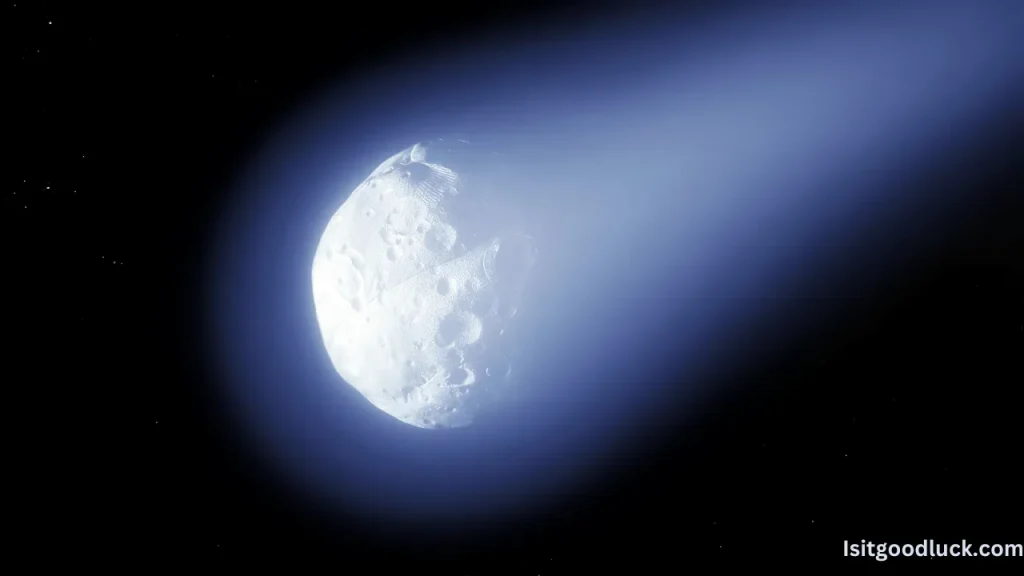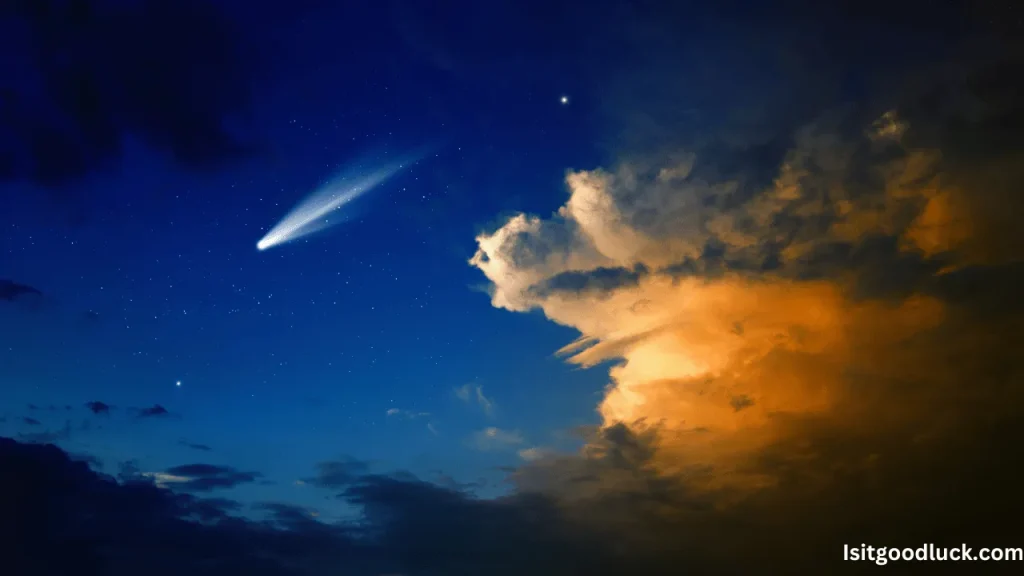Gazing up at the night sky and seeing a comet streaking across can evoke many emotions. For many, it is a mesmerizing and even spiritual experience.
Throughout history, comets have captured our imagination, evoking wonder, curiosity, and sometimes fear. But a frequently asked question is, “Is it good luck to see a comet?”
Contents
- 1 What are Comets?
- 2 How Do Comets Form?
- 3 Comets in History and Culture:
- 4 Delving into the Science of Comets:
- 5 Is it Good Luck to See a Comet?
- 6 Personal Experiences with Comets:
- 7 Conclusion:
- 8 FAQs
- 8.1 Why do some people believe it’s good luck to see a comet?
- 8.2 Have any historical events been positively linked to the appearance of a comet?
- 8.3 Are there any cultures today that celebrate the appearance of a comet?
- 8.4 If seeing a comet doesn’t bring good luck scientifically, why do some people still hold onto the belief?
- 8.5 Are there any rituals or practices associated with making a wish upon seeing a comet?
What are Comets?
Comets, often called ‘cosmic snowballs,’ are fascinating celestial bodies that captivate observers with their bright and shimmering tails when they approach the Sun.
Originating from the cold outer reaches of our solar system, they are composed of ice, rock, and dust. As they journey closer to the Sun, the heat causes the ice to vaporize, forming a glowing coma around their nucleus.
Accompanied by their iconic tails, which can span millions of miles and always point away from the Sun due to the solar wind, comets offer a dazzling display that has enchanted humanity for millennia.
How Do Comets Form?
The birth story of comets begins billions of years ago, in the nascent days of our solar system. As planets started to form from the primordial disk of gas and dust that revolved around the young Sun, not all material was incorporated into worlds.
In the colder, distant regions, far from the Sun’s warmth, certain materials like water, ammonia, methane, and carbon dioxide began to freeze into tiny solid particles.
Over time, these icy particles coalesced, combining with dust and rock, forming the nucleus of what we now recognize as comets.
Most of these primordial remnants were pushed into the solar system’s outskirts, residing in areas like the Kuiper Belt or the Oort Cloud, waiting for gravitational interactions to send them on a journey toward the Sun, where we can observe their luminous transformations.
Also read: Is it Good Luck if a Leaf Falls on You?

Comets in History and Culture:
Comets have been etched in the annals of human history since immemorial. Historical records from ancient Egypt to China bear testimony to our age-old fascination with these celestial bodies.
Depending on the period and region, comets have been perceived as omens of doom and signals of divine messages.
In ancient Rome, the unexpected appearance of a comet in the vast canvas of the sky was taken as an omen that a great ruler’s death was imminent. Fast forward to the Middle Ages, these luminous entities were blamed for catastrophes, from plagues and famines to wars.
However, painting comets as harbingers of doom is just one side of the coin. In stark contrast, the Native Americans from the Great Plains held a respectful view of comets. To them, a comet was not a sign of impending doom but a messenger sent by the gods.
Whenever the presence of a comet graced the night sky, it was an occasion for celebration, marked by dances and elaborate ceremonies.
Delving into the Science of Comets:
To understand the true nature of comets, one must look beyond myths and delve into science. Comets, in their essence, are celestial bodies that revolve around the Sun.
They comprise a mixture of dust, ice, and rock. The solid heart of the comet is termed the nucleus, surrounded by the coma, a halo of gas and dust.
An interesting phenomenon occurs when a comet draws nearer to the Sun. The Sun’s intense heat causes the ice within the nucleus to melt and evaporate. This gives birth to a spectacular tail of gas and dust, trails behind the comet, often visible from Earth.
The paths comets tread around the Sun are elliptical. This implies that their appearances near the Sun, and consequently in our night sky, are occasional. Some grace our skies every few decades, while others might only be visible once in several centuries.

Is it Good Luck to See a Comet?
When it comes to luck, science and superstition often diverge. Scientifically speaking, no evidence links the sighting of a comet to future fortunes or misfortunes. These majestic celestial objects follow their paths, uninfluenced by human lives or beliefs.
However, cultural and personal beliefs play a significant role in shaping our perceptions. While some believe that making a wish upon seeing a comet will make it come true, others view these celestial visitors as signs of prosperity and good times ahead.
Also read: Is It Good Luck to See a Shooting Star?
Personal Experiences with Comets:
One of the most intriguing aspects of comets is the deeply personal experiences they often elicit in those who witness them. To delve deeper into this, I interviewed several individuals who’d seen these celestial wonders.
The firsthand accounts were as varied as they were profound. For some, the sight of a comet streaking across the sky was a moment of awe, akin to witnessing nature’s grandeur.
Others described it as a fleeting yet poignant reminder of life’s transient nature and our small place within the vast cosmos. The reactions were mixed when asked about the age-old superstitions associated with comets.
A few admitted to playfully making wishes, while the thought of comets influencing luck amused others.
However, one sentiment was universal: seeing a comet is unforgettable, not necessarily because of luck or superstitions, but because of the raw, human connection to the universe it ignites.
Conclusion:
In conclusion, the belief in whether a comet brings good luck is deeply personal, shaped by cultural narratives and individual sentiments.
Even if they don’t get lucky in the traditional sense, comets undeniably bestow upon us a sense of wonder and a reminder of our place in the vast universe.
So, the next time you spot a comet in the night sky, perhaps the real luck is in the moment of connection with the cosmos.
You may also read All other articles related to good luck!
FAQs
Why do some people believe it’s good luck to see a comet?
The belief that seeing a comet brings good luck stems from ancient cultures associating unusual or rare celestial events with divine messages or omens. In some cultures, the appearance of a comet was seen as a positive sign, possibly indicating blessings from the gods or an upcoming period of prosperity. Over time, these ancient beliefs evolved into the notion that seeing a comet can be a lucky sign.
Have any historical events been positively linked to the appearance of a comet?
Yes, there have been historical events where the appearance of a comet was seen as a positive omen. For instance, in some ancient civilizations, the birth of royalty or a significant victory in battle might have coincided with the appearance of a comet, leading people to associate the two events. However, it’s crucial to note that these are coincidences, and there’s no causal relationship between comets and terrestrial events.
Are there any cultures today that celebrate the appearance of a comet?
Yes, there are cultures around the world that still celebrate or revere the appearance of comets. For example, certain Native American tribes view comets as messengers from the gods and might hold special dances or ceremonies when one is visible. While modern scientific understanding has demystified many aspects of comets, their cultural and spiritual significance remains for many.
If seeing a comet doesn’t bring good luck scientifically, why do some people still hold onto the belief?
Like many other superstitions, beliefs surrounding comets are often rooted in tradition, culture, and personal experiences. While science provides objective explanations, human emotions, and cultural practices significantly shape our perceptions of the world. For many, the rare and awe-inspiring sight of a comet can evoke strong emotions and feelings of wonder, making it a memorable event. This emotional connection can lead some to attribute personal significance or luck to the experience.
Are there any rituals or practices associated with making a wish upon seeing a comet?
In some cultures and traditions, individuals might make a wish when they first spot a comet, similar to when they see a shooting star. The specifics of the ritual or the act of making a wish can vary based on individual beliefs and cultural backgrounds. It’s a personal and often intimate moment where individuals connect with the vastness of the universe, even if only symbolically.





